Superintendent Of The United States Military Academy
The superintendency had often been a stepping stone to higher prominence in the Army. Four superintendents became Chief of Staff of the Army: Hugh Lenox Scott, Douglas MacArthur, Maxwell Davenport Taylor, and William Westmoreland. The list of superintendents includes five Medal of Honor recipients: Oliver Otis Howard, Douglas MacArthur, Albert Leopold Mills, John McAllister Schofield, John Moulder Wilson. The post is now a terminal assignment in the Army; as a condition for detail to the position, officers are required by law to acknowledge that they will retire at the end of their appointment. This formulation was meant to secure the independence of superintendents from unlawful command influence; however, in practice the resulting "lame duck" status restricts their power and influence in the Army. Since 2010, the army has considered reverting to the previous system or recalling a retired officer to fill the post. The mandatory retirement precedent was not followed when Darryl A. Williams was nominated in June 2022 to serve as Commanding General, United States Army Europe and Africa.
The billet carries the rank of lieutenant general, and is not counted against the Army's statutory limit on the number of active-duty officers above the rank of major general. For example, General Andrew Goodpaster originally retired from active duty as a full general, was recalled to assume the superintendency as a lieutenant general, and reverted to his four-star rank upon his second retirement.
Superintendents
- Note: "Class year" refers to the alumnus's class year, which usually is the same year they graduated. However, in times of war, classes often graduate early.
- A "—" in the class year column indicates a superintendent who is not an alumnus of the academy.
|
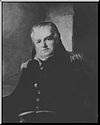 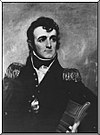   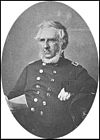 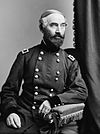 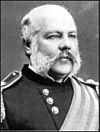 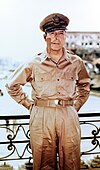 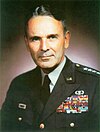  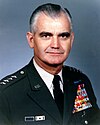     |
See also
- Superintendent of the United States Naval Academy
- Superintendent of the United States Air Force Academy
References
- General
^ a: Special Collections: Biographical Register of the Officers and Graduates of the U. S. Military Academy. West Point, NY: United States Military Academy Library. 1950.
- Inline citations
- ^ Dwyer, Jim (3 January 2009). "Willard W. Scott Jr. Is Dead at 82; Led West Point Through Change". The New York Times. Retrieved 13 May 2009.
- ^ Chambers, William A. Project Leader (December 2014). "Review of the Roles, Selection, and Evaluation of Superintendents of Military Service Academies" (PDF). Defense Technical Information Center (DTIC). Alexandria, VA: Institute for Defense Analyses. pp. 8–9. Retrieved 13 June 2022.
- ^ Judson, Jen (3 June 2022). "West Point superintendent slated to lead US Army Europe and Africa". Army Times. Tysons, VA.
- ^ "Williams, Jonathan, (1750–1815)". Biographical Directory of the United States Congress. Retrieved 6 April 2009.
- ^ "Williams, Jonathan Mss". Lilly Library Manuscript Collections. Indiana University. Retrieved 6 April 2009.
- ^ "Commanders of the Corps of Engineers". United States Army Corps of Engineers. Archived from the original on 22 May 2009. Retrieved 31 May 2009.
- ^ Cohen, Fred (1995). "A Short History of Cryptography". Fred Cohen & Associates. Retrieved 9 April 2009.
- ^ Ambrose, Stephen E. (1969). Duty, Honor, Country: A History of West Point. Baltimore, MD: The Johns Hopkins University Press. pp. 28–29, 34. ISBN 0-8018-6293-0. Retrieved 9 April 2009.
- ^ Crackle, Theodore (2003). West Point: A Bicentennial History (Illustrated ed.). Lawrence, KS: University Press of Kansas. pp. 60–66. ISBN 0-7006-1294-7.
- ^ "Alden Partridge". United States Military Academy. 31 January 2002. Archived from the original on 14 January 2009. Retrieved 6 April 2009.
- ^ "Sylvanus Thayer (1785–1872) Class Of 1808". West Point in the Making of America. Smithsonian Institution. Retrieved 7 April 2009.
- ^ "The Sylvanus Thayer Award". West Point Association of Graduates. Archived from the original on 22 August 2009. Retrieved 7 April 2009.
- ^ "Civil War Defenses of Washington". National Park Service. Retrieved 19 April 2009.
- ^ Boatner III, Mark Mayo (1988) [1959]. The Civil War Dictionary. New York: McKay. p. 84. ISBN 0-8129-1726-X.
- ^ Freeman, Douglas S. (1934). R.E. Lee, A Biography. New York City: Charles Scribner's Sons. pp. 301, 375–95, 425, 476, 602. Retrieved 19 April 2009.
- ^ "Civil War Defenses of Washington". National Park Service. Archived from the original on 13 January 2016. Retrieved 19 April 2009.
- ^ Williams, T. Harry (1955). P.G.T. Beauregard: Napoleon in Gray. Louisiana State University Press. pp. 2–47, 91–168, 203–07. ISBN 0-8071-1974-1.
- ^ Johnson, Frederick Charles (1889). The Historical Record. Vol. 3. Wilkes-Barre, Pennsylvania: Press of the Wilkes-Barre Record. pp. 111–112. Retrieved 19 April 2009.
- ^ "Zealous Bates Tower". Aztec Club. Retrieved 19 April 2009.
- ^ "Culllum Society". West Point Association of Graduates. Archived from the original on 22 August 2009. Retrieved 19 April 2009.
- ^ "Thomas Gamble Pitcher". Arlington National Cemetery. Retrieved 19 April 2009.
- ^ "Georgia Governors' Gravesites Field Guide, 1776–2003" (PDF). Georgia Historic Preservation Division. Archived from the original (PDF) on 18 January 2006. Retrieved 19 April 2009.
- ^ Eicher, John H.; Eicher, David J. (2001). Civil War High Commands. Stanford, CA: Stanford University Press. pp. 472–473. ISBN 0-8047-3641-3.
- ^ "Medal of Honor Recipients, Civil War (A–L)". Army Center of Military History. Retrieved 4 April 2009.
- ^ "Col. John G. Parke" (PDF). The New York Times. 18 December 1900. Retrieved 20 April 2009.
- ^ Leonard, John W.; Marquis, Albert Nelson (1913). Who's who in America. Vol. III. Chicago, IL: A.N. Marquis & Co. pp. 655–656. Retrieved 20 April 2009.
- ^ "Medal of Honor Recipients War With Spain". Army Center of Military History. Retrieved 12 April 2009.
- ^ "Gen. A.L. Mills, Ill 12 Hours, Dies" (PDF). The New York Times. Retrieved 12 April 2009.
- ^ "Hugh Lenox Scott". Arlington National Cemetery. Retrieved 21 April 2009.
- ^ "General T.H. Barry Dies in Washington" (PDF). The New York Times. 31 December 1919. Retrieved 25 April 2009.
- ^ "Past USMA & WPAOG Leadership". West Point Association of Graduates. Retrieved 25 April 2009.
- ^ "Col. Biddle To West Point". The New York Times. 18 May 1916. Retrieved 29 April 2009.
- ^ "Tillman, Samuel Escue". The Mineralogical Record. 2009. Archived from the original on 22 August 2009. Retrieved 25 April 2009.
- ^ "Medal of Honor Recipients World War II (M-S)". Army Center of Military History. Retrieved 2 April 2009.
- ^ Thompson, Paul (24 July 2005). "Douglas MacArthur: Born to Be a Soldier". Voice of America. Archived from the original on 14 August 2009. Retrieved 11 April 2009.
- ^ Sladen, Joseph Alton; Sweeney, Edwin Russell (1997). Making Peace With Cochise: The 1872 Journal of Captain Joseph Alton Sladen. Norman, OK: University of Oklahoma Press. pp. xiii. ISBN 0-8061-2973-5. Retrieved 25 April 2009.
- ^ "At West Point". Time. 17 October 1927.
- ^ "Major General Edwin B. Winans". Brigham Young University. Retrieved 21 April 2009.
- ^ "Smith, William Ruthven". Texas State Historical Association. 18 January 2008. Retrieved 25 April 2009.
- ^ "Jay Leland Benedict". Arlington National Cemetery. Retrieved 25 April 2009.
- ^ "Robert Lawrence Eichelberger". Arlington National Cemetery. Retrieved 22 April 2009.
- ^ "Gen. Francis B. Wilby, 82, Dies; Headed West Point During War". The New York Times. 21 November 1965.
- ^ Krebs, Albin (21 April 1987). "Maxwell D. Taylor, Soldier and Envoy, Dies". The New York Times. Retrieved 22 April 2009.
- ^ "Death on the Han". Time. 5 March 1951. Archived from the original on 21 August 2009. Retrieved 22 April 2009.
- ^ "Frederick Augustus Irving" (PDF). Bowdoin College. Archived from the original (PDF) on 2 August 2010. Retrieved 23 April 2009.
- ^ "New Command Team in Korea". Time. 5 March 1951. Archived from the original on 31 August 2009. Retrieved 24 April 2009.
- ^ Ray, Max (1980). The History of the First United States Army From 1918 to 1980. Fort Meade MD: First United States Army. pp. 120, 124.
- ^ "Obituary: General William Westmoreland". The Independent. Retrieved 24 April 2009.
- ^ Sarantakes, Nicholas Evan (2001). Keystone: The American Occupation of Okinawa and U.S.–Japanese Relations. College Station, TX: Texas A&M University Press. p. 185. ISBN 0-89096-969-8. Retrieved 25 April 2009.
- ^ Bartelt, Eric S. (9 December 2005). "Former Superintendent dies". United States Military Academy. Archived from the original on 4 July 2007. Retrieved 24 April 2009.
- ^ Stout, David (11 February 2006). "Gen. S.W. Koster, 86, Who Was Demoted After My Lai, Dies". The New York Times. Retrieved 24 April 2009.
- ^ "Hollister Knowlton Betrothed To David H. Petraeus, a Cadet". The New York Times. 12 May 1974. p. GN57. Retrieved 24 April 2009.
- ^ "What Price Honor?". Time. 7 June 1976. Archived from the original on 21 August 2009.
- ^ "General Andrew J. Goodpaster, USA". NATO. Archived from the original on 13 February 2009. Retrieved 24 April 2009.
- ^ "United States Army, V Corps Leaders". V Corps. 27 June 2008. Archived from the original on 24 April 2009. Retrieved 25 April 2009.
- ^ "2005 Distinguished Graduate Award: David R. Palmer". West Point Association of Graduates. Archived from the original on 22 August 2009. Retrieved 20 April 2009.
- ^ Eric Pace (16 September 2003). "Gen. Howard D. Graves, 64; Led West Point and Texas A&M". The New York Times. Retrieved 4 April 2009.
- ^ "Lieutenant General Daniel W. Christman". West-Point.org. Retrieved 19 April 2009.
- ^ Hamburger, Andrea (19 July 2002). "USMA celebrates St. Cyr's bicentennial". United States Military Academy. Retrieved 25 April 2009.
- ^ John Doherty (28 February 2006). "New Point leader named". Times Herald-Record. Retrieved 22 September 2013.
- ^ "Lt. Gen. David H. Huntoon Jr. Becomes New Superintendent of West Point". Fox News. 22 July 2010. Retrieved 22 September 2013.
- ^ Mike Strasser (17 July 2013). "Caslen assumes command of West Point". United States Army. Retrieved 22 September 2013.
- ^ West Point gets 1st black superintendent in 216-year history Retrieved 6 July 2018
- ^ "West Point Welcomes New Superintendent". U.S. Military Academy. West Point, New York: West Point Public Affairs. 24 June 2022. Retrieved 25 June 2022.

